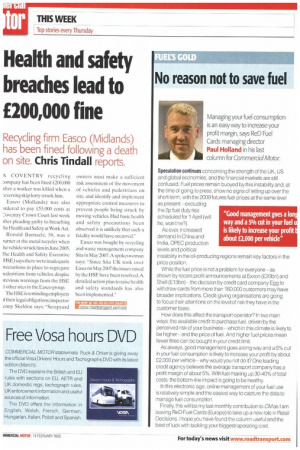No reason not to save fuel
Page 14

If you've noticed an error in this article please click here to report it so we can fix it.
Managing your fuel consumption is an easy way to increase your profit margin, says ReD Fuel Cards managing director Paul Holland in his last column for Commercial Motor.
Speculation continues concerning the strength of the UK, US and global economies, and the financial markets are still confused. Fuel prices remain buoyed by this instability and, at the time of going to press, show no signs of letting up over the short-term, with the 2009 futures fuel prices at the same level as present excluding the 2p fuel duty rise scheduled for 1 April (will he, won't he?).
As ever, increased demand in China and India, OPEC production levels and political instability in the oil-producing regions remain key factors in the price position.
While the fuel price is not a problem for everyone as shown by recent profit announcements at Exxon (£20bn) and Shell (£13bn) the decision by credit card company Egg to withdraw cards from more than 160,000 customers may have broader implications. Credit-giving organisations are going to focus their attentions on the level of risk they have in the customer base.
"Good management goes a Ion way and a 5% cut in your fuel u is likely to increase your profit about £2,000 per vehicle"
How does this affect the transport operator? In two main ways: the available credit to purchase fuel, driven by the perceived risk of your business -which in this climate is likely to be higher and the price of fuel. And higher fuel prices mean fewer litres can be bought in your credit limit.
As always, good management goes a long way and a 5% cut in your fuel consumption is likely to increase your profit by about £2,000 per vehiclewhy would you not do it? One leading credit agency believes the average transport company has a profit margin of about 5%. With fuel making up 30-40% of total costs, the bottom-line impact is going to be healthy.
In this electronic age, online management of your fuel use is relatively simple and the easiest way to capture the data to manage fuel consumption.
Finally, this will be my last monthly contribution to CMas I am leaving ReD Fuel Cards (Europe) to take up a new role in Retail Decisions. I hope you have found the column useful and the best of luck with tackling your biggest operating cost.
































































































































































